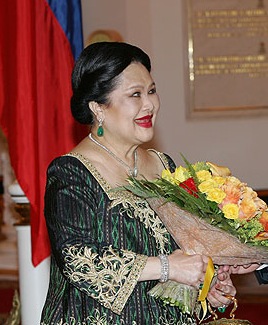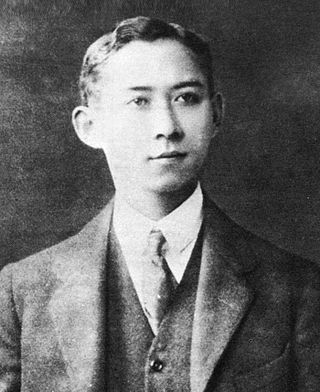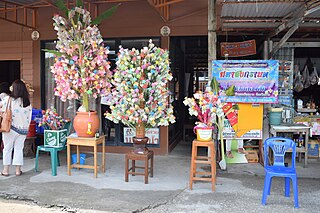Related Research Articles

Bhumibol Adulyadej, posthumously conferred with the title Bhumibol the Great, was the ninth king of Thailand from the Chakri dynasty, titled Rama IX, from 1946 until his death in 2016. His reign of 70 years and 126 days is the longest of any Thai monarch, the longest of an independent Asian sovereign and the third longest verified reign of any monarch of a sovereign state in history after Louis XIV and Elizabeth II.

Sirikit is a member of the Thai royal family who was Queen of Thailand from 28 April 1950 to 13 October 2016 as the widow of King Bhumibol Adulyadej. She is the mother of King Vajiralongkorn.

Maha Chakri Sirindhorn, Princess Royal is a member of the Thai royal family. She is the second daughter of King Bhumibol Adulyadej and Queen Sirikit, and the younger sister of Maha Vajiralongkorn.

Mahidol University is an autonomous public research university in Thailand. The university was founded as part of Siriraj Hospital in 1888. It was first called the University of Medical Science in 1943, and has been recognized as Thailand's fourth public university. The university was renamed in 1969 by King Bhumibol Adulyadej for his father, Prince Mahidol of Songkhla, known as the "Father of Modern Medicine and Public Health in Thailand".

Mahitala Dhibesra Adulyadej Vikrom, the Prince Father, formerly Prince Mahidol Adulyadej, Prince of Songkhla or Mahidol Songkla, was the father of King Ananda Mahidol and King Bhumibol Adulyadej of Thailand, and the paternal grandfather of King Vajiralongkorn. He was also regarded as the father of modern medicine and public health in Thailand. He also founded the House of Mahidol or the present Royal Family of Thailand. His two sons reigned for more than eight decades, longer than the Ibn Saud siblings of Saudi Arabia, and the Nahyan siblings of Abu Dhabi.

Galyani Vadhana, Princess of Naradhiwas was a princess of Thailand and the elder sister of King Ananda Mahidol and King Bhumibol Adulyadej. She was also a direct granddaughter of King Chulalongkorn and Queen Sri Savarindira and the aunt of King Vajiralongkorn.

Sri Savarindira, also known as Savang Vadhana. She was a half-sister and queen of King Chulalongkorn. After her first grandson's accession to power in 1935, she became known as Her Majesty Queen Sri Savarindira, The Queen Grandmother of Thailand title in Thailand is Somdetch Phra Phan Vassa Ayika Chao. All her children died before her and she lived to see her grandsons Ananda Mahidol and Bhumibol Adulyadej take the throne.

Faculty of Medicine Siriraj Hospital, Mahidol University is the oldest and largest medical school and the oldest of any kind of university faculty in Thailand. The faculty is now part of Mahidol University. Founded in 1889, the faculty was run in co-operation with Siriraj Hospital, the first public hospital in Thailand, which provides students with clinical experience. The faculty's campus and hospital is in the Bangkok Noi District, Bangkok, on the former Rear Palace. The medical school accepts about 250 students for undergraduate education and more than 100 to postgraduate studies each year.

The Royal Plaza, or formally Dusit Palace Plaza, and also known among Thais as Equestrian Statue Plaza, is an important public square in the palace and government quarter of Bangkok, the capital of Thailand.

The Palace Law of Succession, Buddhist Era 2467 (1924) governs succession to the Throne of the Kingdom of Thailand, under the ruling House of Chakri. Succession matters prior to the end of absolute monarchy in 1932 could be contentious, especially during the Ayutthaya period from the 14th to 18th centuries. In 1924, King Vajiravudh attempted to clarify the succession process by laying down the Palace Law of Succession. It was promulgated and came into effect in November 1924 as, in part, an attempt to eliminate the vagueness relating to succession within the Thai monarchical regime and to systematically resolve previous controversies. In 1932, after Siam became a constitutional monarchy, various amendments relating to succession were introduced. The 1997 Constitution of Thailand relied on the law with regards to succession, but the 2006 Interim Constitution made no mention of succession, leaving it to "constitutional practice". The 2007 Constitution again relied on the Palace Law. The preamble of the 2014 interim constitution of Thailand abrogated the 2007 Constitution, with the exception of chapter 2, concerning the monarchy and the succession.

The bi-metallic Thailand ten-baht coin is a denomination coin of the Thai baht, the currency unit of Thailand.

Robert Lingat, was a French-born academic and legal scholar most known for his masterwork on the practice of classical Hindu Law. He died May 7, 1972, one year before the first English translation of his work established it as the single most authoritative text on the concept of dharma in Indian legal history. This followed three decades after his three-volume Thai-language edition of Siamese laws (1939-1940) earned him recognition from renowned legal scholar John Henry Wigmore as "the greatest authority on Siamese legal history," adding: "It will be a notable day when the learned editor will produce for us a translation in French."

Gordon Hannington Luce was a colonial scholar in Burma. His outstanding library containing books, manuscripts, maps and photographs – The Luce Collection – was acquired by the National Library of Australia in 1980, as part of its major research collections on Asia.

Wat Chetawan is a Thai temple in Petaling District, Selangor, Malaysia. The temple is situated at Jalan Pantai, off Jalan Gasing in Petaling Jaya. It was built in 1957 and officiated by the late King Bhumibol Adulyadej, the King of Thailand at the time. The temple is also the only Malaysian Siamese temple which has been chosen as the custodian of the Buddha sacred relics for all Malaysian Buddhists that are parts of the ancient relics discovered in Piprahwa, a village in Uttar Pradesh near the border of the Kingdom of Nepal in 1898 which were presented to King Chulalongkorn of Siam by the then British Viceroy of India, Lord Curzon.
State decorations awarded by Thai King take the form of orders and medals. This page lists them by order of precedence.
Rajamangala University of Technology Lanna is a science and technology university in Chiang Mai Province, northern Thailand. It offers vocational certificate, advanced vocational certificate, undergraduate, and master's degrees.

Dusit Palace is a compound of royal residences in Bangkok, Thailand. Constructed over a large area north of Rattanakosin Island between 1897 and 1901 by King Chulalongkorn. The palace, originally called Wang Suan Dusit or 'Dusit Garden Palace' (วังสวนดุสิต), eventually became the primary place of residence of the King of Thailand, including King Chulalongkorn, King Vajiravudh, King Prajadhipok, King Bhumibol Adulyadej and King Vajiralongkorn. The palace covers an area of over 64,749 square metres (696,950 sq ft) and is dotted between gardens and lawns with 13 different royal residences. Dusit Palace is bordered by Ratchwithi Road in the north, Sri Ayutthaya Road in the south, Ratchasima Road in the west and U-Thong Nai Road on the east.

The Siam Society Under Royal Patronage was established in 1904 with a mission to promote knowledge of the culture, history, arts, and natural sciences of Thailand as well as those of neighbouring countries. The premises of the Society in Bangkok, Thailand on Asok Montri Road include a library with many rare books and the Kamthieng House Museum in a historic teak house. The Society has a regular programme of lectures, study trips, cultural events, and music performances. The Society publishes two scholarly journals, the Journal of the Siam Society and the Natural History Bulletin of the Siam Society, and several books. The Society is involved in preservation of heritage through the Siamese Heritage Trust. The membership includes people of around 60 nationalities.

The banknotes of the Thai baht are part of the physical form of the Thai baht, Thailand's currency. The issuance of the baht banknotes is managed by the Bank of Thailand. Throughout its history, the denominations have ranged from 1 baht to 1,000 baht. The circulating banknotes today in Thailand, however, are ranged from 20 baht, 50 baht, 100 baht, 500 baht and 1000 baht. The currently circulating series are 17th, 16th and 15th series. Thai baht banknotes commonly include the portrait or the picture of the sculpture of its kings. The obverses have been designed with the current king's portrait. Whilst, in the reverses, mostly the picture of notable kings and kings with the title "the great". Some reverses feature the King Bhumibol's sayings.
References
- ↑ Frankfurter, O. (1904). "The Aims of the Society" (PDF). Journal of the Siam Society. 1. Siam Society: 1–6. Retrieved March 17, 2013.
- ↑ "The Siamese Heritage Protection Program To Commemorate the 84th Royal Birthday Anniversary of His Majesty King Bhumibol Adulyadej Patron of The Siam Society Under Royal Patronage". by the Siamese Society under Royal Patronage. Siamese Heritage Trust. 20 April 2013. Retrieved 21 April 2013.
To commemorate the 84th Royal Birthday Anniversary of His Majesty King Bhumibol Adulyadej, the Patron of the Siam Society and protector of fine arts and cultural heritage of Thailand, the Council of the Society approved the establishment of a new program, Siamese Heritage Protection Program, or โครงการพิทักษ์มรดกสยาม in Thai.
- ↑ "Siam Society journal now available to all". Bangkok Post . 9 July 2012. Retrieved 19 March 2013.
- ↑ "Thailand Information Center". Office of Academic Resources. Chulalongkorn University. 20 April 2013. Retrieved 21 April 2013.